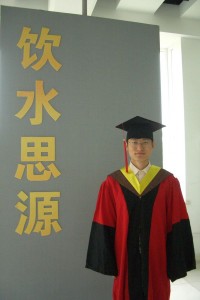When I graduated in 2002, I faced in the choice of whether finding a job or continuing my studies. I’d like to learn more “electricity” related technologies, and also for a better job, I decided to continue pursuing a doctoral graduate student. So I chose to enter Shanghai Jiao Tong University to pursue PhD.
I spent a lot of time in preparing the PhD entrance exam. It was in the end of my master period, when I was facing to complete the master’s thesis. It was a little bit hard period. Fortunately, the examination result was good, and I got the offer from SJTU.
My PhD major was Automation & Instrumentation Engineering, belonging to School of Electronic Information and Electrical Engineering, Shanghai Jiao Tong University. My research direction was intelligent mechatronics system control. My research topic was the research in high performance induction motor variable-frequency speed control technologies.
In fact, the doctoral student should not be completely counted as a student, but rather a role of researcher. For doctoral students, one of the biggest problems facing to them is to find a suitable research direction. Fully understand today’s latest development in a very narrow area of your research direction, find a breakthrough, and then develop your own set of innovative methods. This is a tough and challenging process. Your mentor can only give you a general direction. It’s your own business to find the exact direction of innovation.
For me, PhD period was a huge challenge of my learn abilities and research capacities. I never learned the knowledge of induction motor before, and motor control knowledge was blank. For the latest intelligent control methods, I even never heard of them. I must master all knowledge mentioned above within a short span of a year or two, so I could move on to my research. It was impossible to perform the research work without solid basic knowledge.
In just two years time, in addition to the completion of my compulsory courses, I learned knowledge of motor and its controlling technologies, as well as some popular intelligent control methods (such as fuzzy control, neural network control, etc.). And also I learned the programming of Matlab/Simulink, and DSP controller programming knowledge. Through this period of learning experiences, my self-learning ability was fully tested. Now I’m fully confident with my learning ability.
The next step was to determine the research subject of my doctoral dissertation. That’s to say, I must find the innovation points. My experience is that innovation does not just rely on imagination. It comes out only after you have a full, comprehensive understanding of current developments in the field. Therefore, it’s necessary to read a large number of references in the related field. After reading enough references, you will have some ideas. Continue reading more references, more comprehensive understanding of the field, your own ideas will become clearer and clearer. Finally, your innovation will come out naturally.
In the process of doing research, there was another experience – discussion would be very helpful. Sometimes, you were puzzled by something, but maybe someone’s inadvertently sentence in the discussion will remind you!
Experiment is a very important part for PhD research. My motor speed control experiments utilized TI’s DSP controller TMS320F240. Its programming was basically similar to the programming of a single-chip controller. There was no operating system running in the board, and the application was directly implemented by assembly language. Vector table setup, initializing, register operations, interrupts handling, and etc. This experience gave me a very direct knowledge on the bottom of an embedded system. The DSP programming experience helped me establish a solid foundation for later learning embedded systems and related work.
Overall, my PhD period was really an unusual experience. Experienced many difficulties. There were many difficult times. However, there were a few key moments I was so happy that I could vividly remember them. The first moment was when my basic motor control model in Matlab/Simulink was successfully run. This was a landmark moment. Only after this, it was possible to carry out various studies based on the model. The second moment was when my English paper was accepted by a SCI journal. It proved the feasibility of my study, and also reassured me – at least graduation should not be a problem. The third moment was the successful implementation of my control algorithm in the motor DSP control experiments. When the collected experimental data was firstly displayed on the screen, at that moment, I literally jumped with joy!
After some twists and turns, finally graduated fairly smooth. Shanghai Jiao Tong University is one of the most famous universities in China. Achieving a PhD degree here makes me proud!
From 1995 first entering university, to PhD graduation in 2005, I lived in university campus for about 10 years. In retrospect, my college life was very simple. Almost all my minds were focused on study-related things, so I could concentrate on learning. I benefited from that. I achieved excellent academic performance, and learned a lot. Even in the PhD period with such a pressure, I could also handle relatively smoothly. However, there were some regrets. For example, did not have experiences as an intern, and did not join any associations in college. Also, in my several stages of study, as well as later stages of my work, I was engaged in different areas. Although I tasted a wide range of knowledge, I could not dig in deeply in one field.
